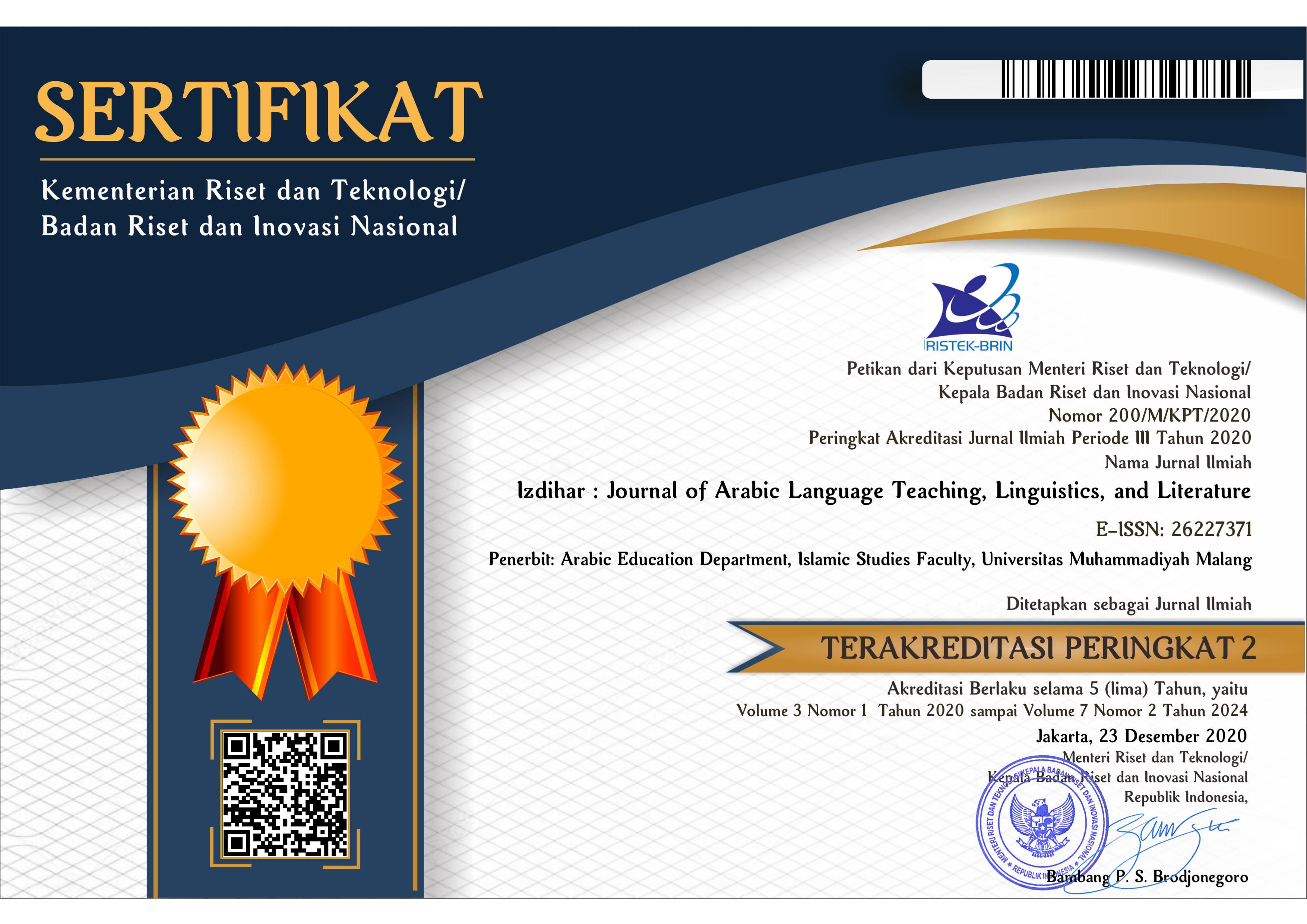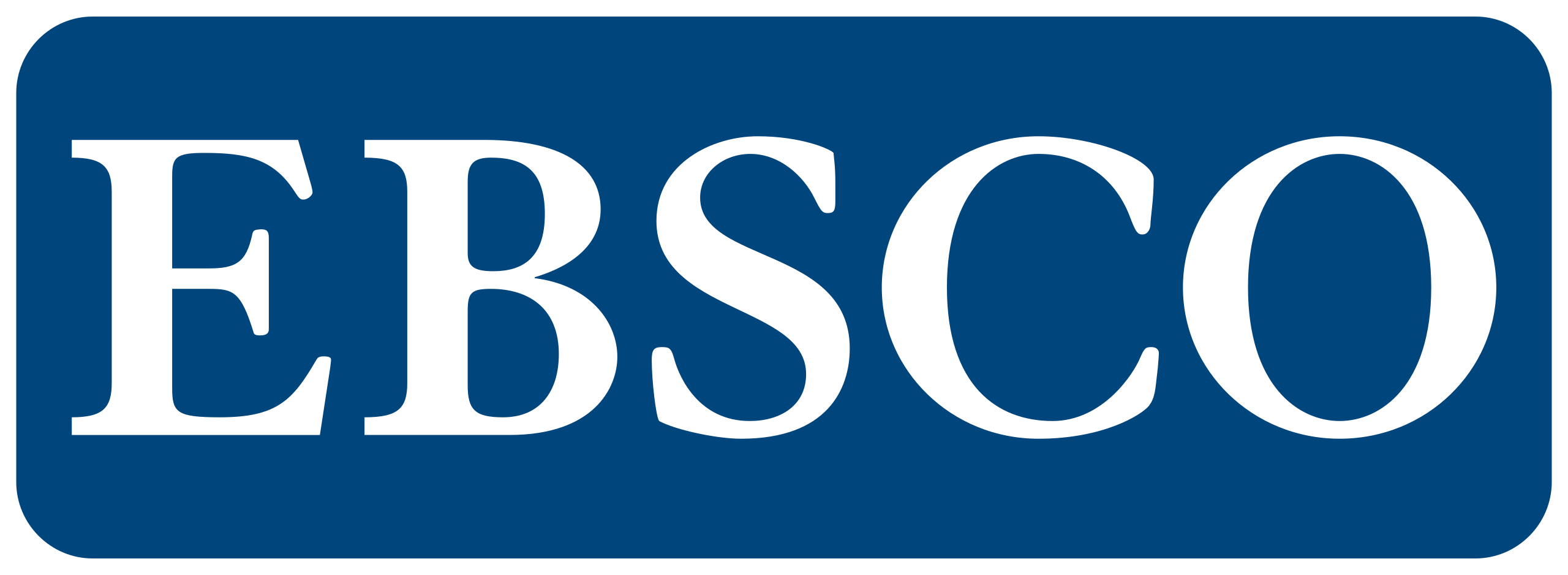Brainstorming and Methapor Patterns in Creativity, Insya Hurr, Through Online Learning on Instagram hashtags
DOI:
https://doi.org/10.22219/jiz.v4i1.15810Keywords:
Brainstorming, Creativity, Insya Hurr, Metaphor, Online LearningAbstract
Creative thinking is one of the learning objectives proclaimed by the Indonesian government. Creativity includes four aspects, namely flexibility, originality, fluency and elaboration. The purpose of this study was to describe the implementation of these two patterns in learning insya hurr with Instagram hashtags. The research method used was descriptive qualitative of 98 active students (classes A, B, C) in semester II of the Department of Arabic Language Education STIQ Amuntai South Kalimantan for the period 2019-2020. The results of the study were the implementation of learning in 4 stages, namely: (1) the stage of brainstorming on creativity criteria on flexibility and originality by generating new ideas as story titles; (2) the brainstorming stage of fluency and elaboration creativity criteria with developing ideas into stories with the help of 5W1H and pictures; (3) metaphor on connect, relate, explore, and analyze with the review process; (4) metaphor the transform and experience with the publication and appreciation process (verbal and extrinsic motivation). Students could develop ideas that are varied and different from the writings of their peers, have the confidence to publish their own work with a good sentence structure. Students got motivation, support and direction for writing improvements because the lecturer in this pattern was the motivator and reviewer without giving an assessment in the form of numbers and without rejecting student ideas (all ideas are considered to be correct with improvements). In the process of implementing learning, students couldn’t know the results of the achievements in the form of numbers.
Downloads
References
AlGhamdi, M. A. (2018). Arabic learners’ preferences for Instagram English lessons. English language teaching, 11(8), 103. https://doi.org/10.5539/elt.v11n8p103
Al-Khuli, M. A. (2008). Strategi Pembelajaran Bahasa Arab. Basan Publishing.
ALRababah, I., & Rababah, L. (2018). The use of brainstorming strategy among teachers of Arabic for speakers of other languages (ASOL) in writing classes. International Journal of English Linguistics, 9(1), 15. https://doi.org/10.5539/ijel.v9n1p15
Alzoubi, A. M., Al Qudah, M. F., Albursan, I. S., Bakhiet, S. F., & Abduljabbar, A. S. (2016). The effect of creative thinking education in enhancing creative self-efficacy and cognitive motivation. Journal of Educational and Developmental Psychology, 6(1), 117. https://doi.org/10.5539/jedp.v6n1p117
Anwar, B. (2019). Model pembelajaran metaphor. Shaut al Arabiyyah, 7(1), 78. https://doi.org/10.24252/saa.v7i1.9915
Ardiansyah, A. A., & Muhammad, A. (2020). Implementation of integrative Arabic grammar (nahwu & sharaf) curriculum in islamic boarding school. Izdihar : Journal of Arabic Language Teaching, Linguistics, and Literature, 3(3), 211–228. https://doi.org/10.22219/jiz.v3i3.13264
Arni, N. C. (2019). Profil berpikir metaforis siswa smp dalam memecahkan masalah matematika ditinjau dari gaya kognitif. Jurnal Ilmiah Soulmath : Jurnal Edukasi Pendidikan Matematika, 7(2), 85. https://doi.org/10.25139/smj.v7i2.1520
Audina, N. A., & Muassomah, M. (2020). Instagram: Alternatif media dalam pengembangan maharah al-kitabah. Al-Ta’rib : Jurnal Ilmiah Program Studi Pendidikan Bahasa Arab IAIN Palangka Raya, 8(1), 77–90. https://doi.org/10.23971/altarib.v8i1.1986
Aziz, R. (2009). Pengaruh kegiatan synectics terhadap kemampuan menulis kreatif. Gifted Review: Jurnal Keberbakatan Dan Kreativitas, 3(2), 1–14.
Bahruddin, U., Amrullah, A. M. K., & Audina, N. A. (2021). Constructivism in Maharah Kalam Lecture Using the Instagram Media: The Implementation, Problems, and Tertiary Students’ Perceptions in Indonesia/Kontruktivisme dalam Perkuliahan Maharah Kalam Menggunakan Media Instagram: Implementasi, Problematika dan Persepsi Mahasiswa di Indonesia. Arabiyatuna: Jurnal Bahasa Arab, 5(1), 127–140. http://dx.doi.org/10.29240/jba.v5i1.2396
Creswell, J. W. (2014). Research design pendekatan kualitatif, kuantitatif, dan. mixed. Pustaka Pelajar.
Deviana, A. D. (2020). Al-Kafā’atu al-żātiyyatu ladā al- ṭalabati fī tanfīżi istirātījiyyāti ta’līmi isso (al-ta’līmi al-żātīy wa al-iyhāiyyati wa al-muţaşhili al-mubāsyiri). al Mahāra: Jurnal Pendidikan Bahasa Arab, 6(1), 119–132. https://doi.org/10.14421/almahara.2020.061.07
Deviana, A. D., Asri, F., & Rusuly, U. (2019). Relation between self-efficacy and creative thinking at writing skill learning. Dinamika Ilmu, 19(2), 197–210. https://doi.org/10.21093/di.v19i2.1553
Fauzi, M. F., Murdiono, M., Anindiati, I., Nada, A. L. I., Khakim, R. R., & Mauludiyah, L. (2020). Developing Arabic language instructional content in canvas lms for the era and post covid-19 pandemic. Izdihar: Journal of Arabic Language Teaching, Linguistics, and Literature, 3(3), 161–180. https://doi.org/10.22219/jiz.v3i3.15017
Ghanim, M. M. (2009). Muqaddimah fi tadris al-tafkiir. Dar Al-Tsaqafah Li An-Nasr wa At-Tauzii.
Hamid, M. A., Baharuddin, U., & Mustafa, B. (2008). Pembelajaran bahasa Arab: pendekatan, metode, strategi, materi dan media. UIN Malang Press.
Hassoubah, Z. I. (2004). Developing Creative and crtical thingking skills (B. Suryadi, Penerj.; 2004 ed.). Yayasan Nuansa Cendikia.
Khodijah, N. (2014). Psikologi Pendidikan. Rajawali Pers.
Li, J.-T., & Tong, F. (2019). Multimedia-assisted self-learning materials: The benefits of e-flashcards for vocabulary learning in Chinese as a foreign language. Reading and Writing, 32(5), 1175–1195. https://doi.org/10.1007/s11145-018-9906-x
Miles, M., & Huberman, A. M. (t.t.). Analisis Data Kualitatif: Buku Sumber Tentang Metode-Metode Baru. UI Press.
Muradi, A. (2015). Pembelajaran menulis bahasa Arab dalam perspektif komunikatif,. Kencana.
Nurlaela, L. (2015). Developing creative thinking skills in learning at higher-educational institution of teacher: 3rd UPI International Conference on Technical and Vocational Education and Training, Bandung, Indonesia. https://doi.org/10.2991/ictvet-14.2015.26
Purnamasari, D.M. & Yahya, A.N. (2020, June 21.). UPDATE 21 Juni: Total Kasus Covid-19 di Indonesia Jadi 45.891, Tambah 862. Kompas .Com. Diakses dari https://nasional.kompas.com/read/2020/06/21/15553501/update-21-juni-total-kasus-covid-19-di-indonesia-jadi-45891-tambah-862
Pimada, L. H., Toba, R., & Rasyidi, A. W. (2020). Learning of Imla’ Using Flashcards on Writing Skill at Islamic Elementary School Level in Samarinda. Izdihar : Journal of Arabic Language Teaching, Linguistics, and Literature, 3(1). https://doi.org/10.22219/jiz.v3i1.11682
Rababah, L. M., Mohamed, A. H., Jdaitaw, M. T., & Melhem, N. Z. B. (2013). The level of creativity in English writing among Jordanian secondary school students. Arts and Design Studies, 10, 25–29. https://www.iiste.org/Journals/index.php/ADS/article/view/6094
Rababah, L., & Melhem, N. B. (2015). Investigation into strategies of creativity in EFL writing in Jordan. Journal of Literature, Languages and Linguistics, 3(5), 14–25. https://www.iiste.org/Journals/index.php/ADS/article/view/6094
Rusady, A. T. (2018). Dawaafi'u At-thullaab fii Ta'allumi Al-Lughah Al-'Arabiyyah wa Daur Al-Mua'allim fii Tarqiyatiha. Izdihar: Journal of Arabic Language Teaching, Linguistics, and Literature, 1(1), 65–78. https://doi.org/10.22219/izdihar.v1i1.6563
Sa`diyah, H. (2020). Mahârah al-kitâbah bagi mahasiswa melalui update status pada media whatsapp. AL-AF’IDAH: Jurnal Pendidikan Bahasa Arab dan Pengajarannya, 3(2), 23–37. https://doi.org/10.52266/al-afidah.v3i2.305
Sunito, I., Sukardjo, M., Syukur, R., & Latifah, U. (2013). Metaphor beberapa strategi berpikir kreatif. Indeks.
Wargadinata, W. W. (2020). Mediated Arabic language learning for arabic students of higher education in covid-19 situation. Izdihar : Journal of Arabic Language Teaching, Linguistics, and Literature, 3(1). https://doi.org/10.22219/jiz.v3i1.11862
Downloads
Published
How to Cite
Issue
Section
License
Copyright (c) 2021 Ade Destri Deviana, Lailatul Mubaarokah

This work is licensed under a Creative Commons Attribution-ShareAlike 4.0 International License.
Copyright Notice
Authors who publish with this journal agree to the following terms:
- Authors retain copyright and grant the journal right of first publication with the work simultaneously licensed under a Creative Commons Attribution-ShareAlike 4.0 International License that allows others to share the work with an acknowledgment of the work's authorship and initial publication in this journal.
- Authors are able to enter into separate, additional contractual arrangements for the non-exclusive distribution of the journal's published version of the work (e.g., post it to an institutional repository or publish it in a book), with an acknowledgment of its initial publication in this journal.
- Authors are permitted and encouraged to post their work online (e.g., in institutional repositories or on their website) prior to and during the submission process, as it can lead to productive exchanges, as well as earlier and greater citation of published work (See The Effect of Open Access).
Copyright (c) 2019 Izdihar : Journal of Arabic Language Teaching, Linguistics, and Literature

This work is licensed under a Creative Commons Attribution-ShareAlike 4.0 International License.

















